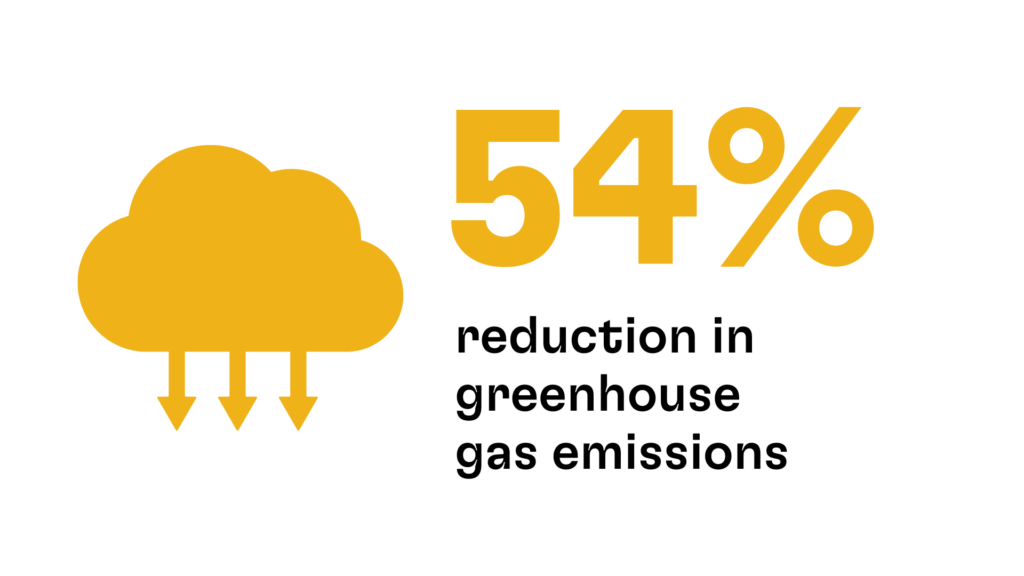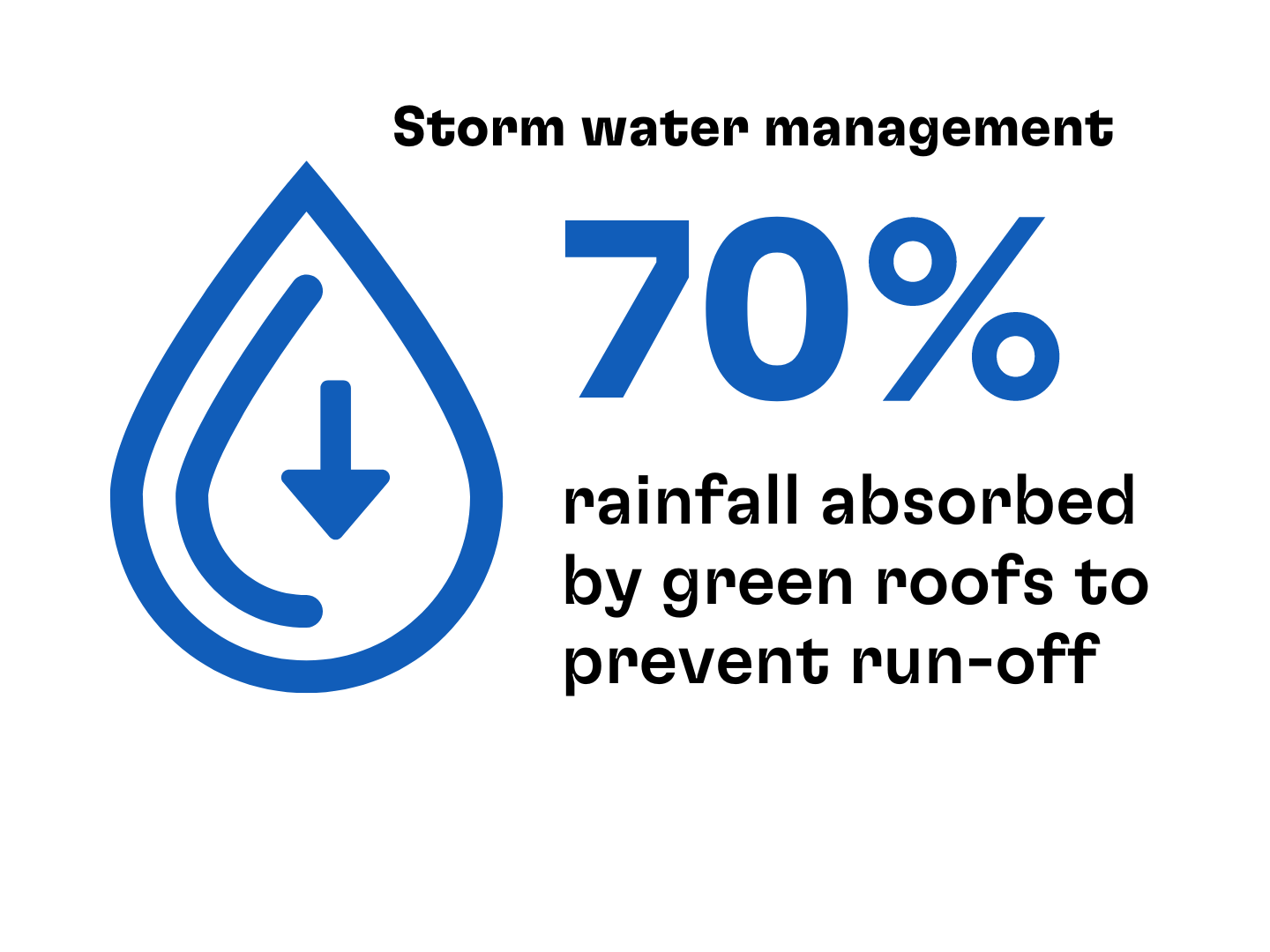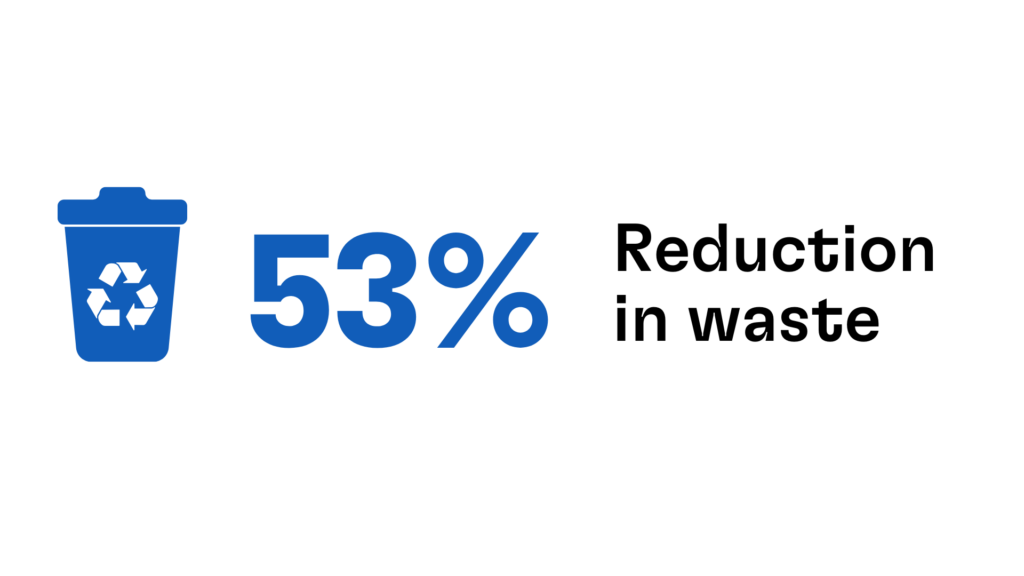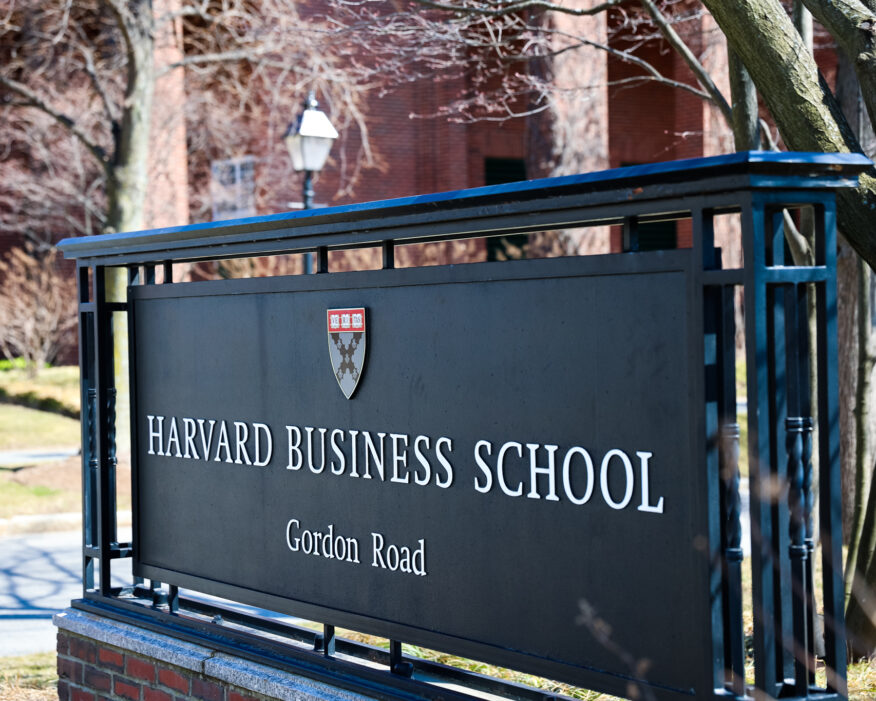Harvard Business School
www.hbs.edu/about/campus-and-culture/Pages/commitment-to-sustainability.aspxHarvard Business School (HBS) endeavors to build a healthier, more sustainable, and inclusive community. HBS is committed to reducing the School’s greenhouse gas emissions, including growth, as part of an effort to increase environmental stewardship while realizing cost savings through efficiency and waste reduction.
Sustainability at HBS

Sustainability initiatives at HBS focus on implementing energy conservation and waste reduction, integrating environmental justice into our campaigns, encouraging individual behavior change, and supporting the health of our community – including our work to avoid chemical classes of concern in building materials.
In CY23*, as part of Harvard’s University-wide goal to reduce greenhouse gas emissions, HBS achieved a 54% reduction in GHG emissions (including growth) along with a 32% reduction in energy consumption, from a 2006 baseline. HBS also made a 53% reduction in waste, a 5% reduction in water, and we have 20 LEED-certified buildings and projects.

HBS: Sustainable Construction & Renovation
HBS has committed to following Leadership in Energy and Environmental Design (LEED) guidelines for all new construction and major renovations with Gold Certification as the minimum goal.

HBS LEED-Certified Buildings:
- Aldrich Hall (LEED Silver)
- Batten Hall, Harvard Innovation Lab (LEED Gold)
- Cash House (LEED Certified)
- Chao Center (LEED Gold)
- Class of 1959 Memorial Chapel (LEED Gold)
- Cumnock Hall Main Floor (LEED Silver)
- Cumnock Hall Upper Floor (LEED Silver)
- Esteves Hall (LEED Platinum)
- Dean’s House (LEED Silver)
- Gallatin Hall (LEED Gold)
- Gallatin Extension (LEED Gold)
- Hamilton Hall (LEED Gold)
- Harvard Center Shanghai (LEED Gold)
- HBS Landing – 114 Western Ave (LEED Gold)
- Klarman Hall (LEED Gold)
- McArthur Hall (LEED Gold)
- McCollum Hall (LEED Gold)
- McCulloch Hall (LEED Platinum)
- Spangler Kitchen (LEED Silver)
- Tata Hall (LEED Platinum)
- Wyss Hall (LEED Gold)
Energy Conservation and Renewable Energy

Energy Conservation: HBS has completed more than 250 energy ECMs aimed at offsetting greenhouse gas emissions and reducing annual operating costs. Projects include two cogen units, a state-of-the-art irrigation system, energy-efficient lighting upgrades, occupancy sensors that control temperature settings in Hamilton Hall bedrooms, daylight sensing, steam trap replacements, kitchen exhaust hood controls, and high-efficiency chillers.

Renewable Energy: HBS has installed solar photovoltaic panels on the roofs of Baker Hall, Batten Hall, Chao Center, Morgan Hall, Shad Hall, Tata Hall, Teele Hall, Travis Hall, and Klarman generating 589,000 kWh/yr.
Continuous Commissioning: HBS has installed innovative software into 19 buildings that continuously monitors our building heating and cooling systems in addition to energy meters to flag high usage in real-time to reduce energy usage and improve comfort.

High-Performance Operations: Additional high-performance standards at HBS include the use of Green Cleaning products, a campus-wide irrigation audit to reduce water use by at least 15%, offering preferred parking for low emitting vehicles, conducting energy audits and water conservation efforts (low flow shower heads, dual-flush toilets, ultra-low flow urinals, low flow faucets).
HBS Landscape
Tree Canopy: Harvard Business School’s mature and dynamic tree canopy consists of more than 1,100 trees. In addition to affording lasting spatial beauty for the campus, the canopy accrues important resiliency and ecological benefits for the HBS community: shade and cooling, rainfall capture and stormwater management, carbon sequestration, oxygen production, and more. HBS Campus Tree Guide includes details about our tree canopy and the route for a lovely campus tree walk. View Harvard Business School’s Campus Tree Guide.
Green Roofs: Green roofs at HBS are thriving on Batten Hall, Chao Hall, the Class of 1959 Memorial Chapel, Shad Hall, Tata Hall, McArthur Hall, McCollum Hall, Klarman Hall, and the Rock Center for Innovation. Not only are green roofs excellent for stormwater management (absorbing up to 70% of rainfall and preventing runoff into the Charles River and sewer systems, thereby reducing concentrations of phosphorous and nitrogen from entering the waterways), but green roofs can also reduce Heat Island Effect and building energy consumption, by serving as an effective roof insulator.
Rewilding Pilot: A small piece of the HBS landscape was rewilded in the spring of 2023. This space now hosts native and naturalized species that will require less maintenance and irrigation than the grass lawn it replaced. Learn more about the creation and goals of our rewilding pilot.
HBS Waste Management

As of the calendar year 2023*, HBS achieved a 53% reduction in waste – higher than the University’s average. This has been accomplished through various HBS waste reduction initiatives including food donations, donations from construction and renovation projects, increased awareness through peer-to-peer education programs, collection stations during move-out, single-stream recycling, collecting back and front-of-house food waste for anaerobic digestion, and utilizing 100% compostable to-go products whenever possible.
The waste management strategy at HBS is to reduce, reuse, recycle, and repurpose food waste. We understand that the best form of waste management is source reduction, which means not creating waste in the first place. The benefits associated with source reduction, recycling, and anaerobic digestion include saving energy, reducing greenhouse gases and conserving natural resources. Our students, staff, and faculty play a big part in helping us reach these goals. By putting food scraps, coffee grounds, and compostable products into the “compost” bins on campus, the HBS community helps to divert organic matter from landfills and generate energy in the form of methane gas. When in doubt, community members can refer to the bins and illustrative signage which have consistent color cues (green for compost, blue for recycling, and black for trash).
Reuse is an important part of waste reduction. Many items from campus use and/or on-campus residents can be donated through the Harvard Surplus Center, including: functional office supplies, kitchen supplies, and textiles. Community members can arrange for donation pickup by submitting a work order in the field service catalog under “Custodial Services > Trash/recycle/compost > Items for donation.” If you have working electronics without data, first check in with HBS IT as these items may belong to them. Otherwise, working electronics without data from campus use can be donated – please label these as “working” to assist the Recycling and Surplus Center. All electronics with data (e.g. computers, hard drives, tablets, jump drives etc.) should be given to HBS IT for data security purposes.
For e-waste recycling and disposal, please note that HBS does not collect items brought in from home.
- All electronics with data should be given to HBS IT. They can also assist with printers and large peripherals like monitors.
- Batteries, chargers, CD’s & DVD’s, toner and ink cartridges can be dropped off with OSS in the Rock Center mail room, along with cell phones and PDA’s from campus residents. Community members can bring these items down to the collection bin, or request assistance from Custodial Services.
- HBS currently recycles plastic film from our loading dock, kitchen, and library. We are working on a permanent “front of house” option where students, staff, and faculty can bring plastic bags, bubble wrap and mailers to recycle. In the meantime, the community can recycle these items on campus at designated collection events during FallFest, WinterFest, SpringFest, and SummerFest. Email sustainability@hbs.edu if you would like to learn more.
Executive Education Outreach at HBS
In FY 2009, HBS rolled out an occupant engagement and outreach program in Executive Education. Projects include policy, operational, and infrastructural changes such as installing sensors that adjust the lighting and HVAC based on room occupancy and windows being opened, providing occupants with reusable mugs and promoting filtered water stations, installing amenity dispensers in showers that reduce the need for plastic shampoo and conditioner bottles, and improving housekeeping’s protocol for recycling and shutting off lights and heating, ventilation and air conditioning.
Business and Environment Initiative (BEI)
The Business and Environment Initiative (BEI) seeks to deepen our collective understanding of the urgent environmental challenges confronting business leaders and to help them use the tools of business to design effective solutions. The BEI aspires to help leaders create economic and political institutions that will enable firms and societies to thrive while maintaining the physical and biological systems on which they depend. The BEI is led by Michael Toffel, Faculty Chair and HBS Professor of Business Administration, and Lynn Schenk, Director. Learn more about environment-related research by HBS faculty.
Student Sustainability Associates
The HBS Student Sustainability Associate Program, founded in 2006, is the school’s peer-to-peer education program that promotes sustainable behavior on and off campus. An SSA is hired from each RC section to connect with their classmates on how key sustainability topics impact business. These topics have included climate change, social equity, environmental justice, transportation, energy, food, and water.

Additional HBS student groups include:
*Campus occupancy was impacted by the COVID-19 pandemic, and remains below our pre-pandemic levels. Reductions from our baseline year of 2006 currently represent both the impacts of our intentional reduction measures and this coinciding reduction in campus occupancy. Fiscal year 2019, our last year with pre-COVID-impacted data, had the following reductions from our 2006 baseline: a 47% reduction in GHG emissions (location-based), a 25% reduction in energy consumption from a 2006 baseline, a 53% reduction in waste, and a 7% reduction in water.
Harvard Business School